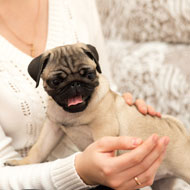
Sessions include debates on brachycephaly and Brexit
Human, not animal, behaviour is set to go under the spotlight at BVA Congress 2017, with debates featuring a line-up of experts digging deep behind the headlines and sharing statistics.
Held at London Vet Show (16-12 November), the two-day programme of sessions will cover a wide array of topics related to the veterinary world. From brachycephalic breeds to Brexit, a common theme will be how vets can better understand human behaviour to improve outcomes for animal health and welfare and the profession.
John Fishwick, who be BVA President at London Vet Show, said: “This exceptional programme will examine a wide range of issues of critical importance for the profession. It will be particularly fascinating to explore the connections between human behaviour and animal welfare and to consider how these connections affect our work and our profession.”
He added: “I’m very much looking forward to joining the debates and I would encourage all vets to make room in their busy London Vet Show schedule to attend BVA Congress and be part of these discussions.”
In the BVA Congress opening session (9.30am, 16 November), attendees will hear from the Behavioural Insights Team which pioneered the application of the ‘nudge theory’ of behaviour change in government. The session will also find out how new technology might help the next generation of pets.
The first session on Thursday afternoon will debate what makes brachycephalic breeds so popular, and what the veterinary profession should be doing about this worrying trend.
Throughout Friday, BVA Congress will look at two major issues facing the profession: Brexit and the possible reform of the Veterinary Surgeons Act. There will also be the keynote Wooldridge Memorial Lecture, with a high-profile speaker to be announced soon.
Friday afternoon’s session will delve into ‘The psychology of antimicrobial resistance’, asking what social science can tell us about client and prescriber behaviour and motivations in relation to production and companion animals.
There will also several sessions focussing on the future of the veterinary profession, building on the work of Vet Futures, the collaborative project between the BVA and the RCVS. These will include an update from the RCVS Graduate Outcomes project and debate ‘What will we need from tomorrow’s vets?’.



 The latest
The latest